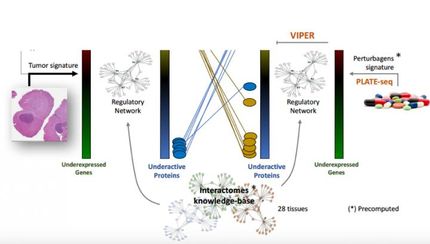On the road to a new cancer therapy starving the tumor
Advertisement
Cancer is the major cause of death among men. Based on the current trends, scientists predict that, by about 2010, cancer will be the No. 1 cause of death for women as well. VIB scientists connected to the Katholieke Universiteit Leuven, in collaboration with the Flemish biotech company ThromboGenics, have been studying the anti-cancer action of anti-PLGF. This substance appears not only to be successful in the treatment of tumors for which the current therapies fail, but it also contributes to the greater effectiveness of existing chemotherapy, and still without side effects. Thus, anti-PLGF might possibly form the basis for a new treatment for cancer.
Peter Carmeliet and his colleagues are using this knowledge concerning the formation of blood vessels, or angiogenesis, to develop new therapies for cancer. Indeed, when the formation of blood vessels that feed tumor cells is blocked, the tumor starves due to the lack of oxygen and nutrients. The existing anti-angiogenesis drugs eliminate the most important angiogenetic growth factor. Unfortunately, this treatment induces side effects, and in addition the cancer compensates by producing other growth factors, so that the drug loses it effect. Therefore, new anti-angiogenesis treatments are needed urgently.
For several years now, the VIB researchers have been investigating a new angiogenetic growth factor: the placental growth factor, or PLGF. Oddly enough, PLGF only stimulates blood vessel formation in cancer and other diseases, but not in a fetus, young children or pregnant women.
VIB researcher Christian Fischer and his colleagues under the direction of Peter Carmeliet and in close collaboration with the biotech company ThromboGenics directed by Désiré Collen have been studying the therapeutic possibilities of anti-PLGF, which retards the action of PLGF. Anti-PLGF not only increases the effectiveness of chemotherapy and the current anti-angiogenesis therapy, but it also inhibits the growth and metastasis of tumors that are resistant to existing drugs. In contrast to the current therapies, anti-PLGF does not trigger a 'rescue operation' in which other growth factors are produced as compensation. Another very important consideration is that anti-PLGF induces absolutely no side effects.
The favorable evaluation of anti-PLGF as a potential cancer treatment raises hope for a more effective cancer therapy with fewer side effects which can be used with children and pregnant women, too. Furthermore, new results indicate that anti-PLGF can also be useful for the treatment of diseases of the eye that lead to blindness. ThromboGenics is focusing on the further development of anti-PLGF as a therapy. The company wants to begin the first clinical tests by the end of this year.
Original publication: Fischer et al., "Anti-PlGF inhibits growth of VEGF(R)- inhibitor resistant tumors without affecting healthy vessels"; Cell 2007.
























































